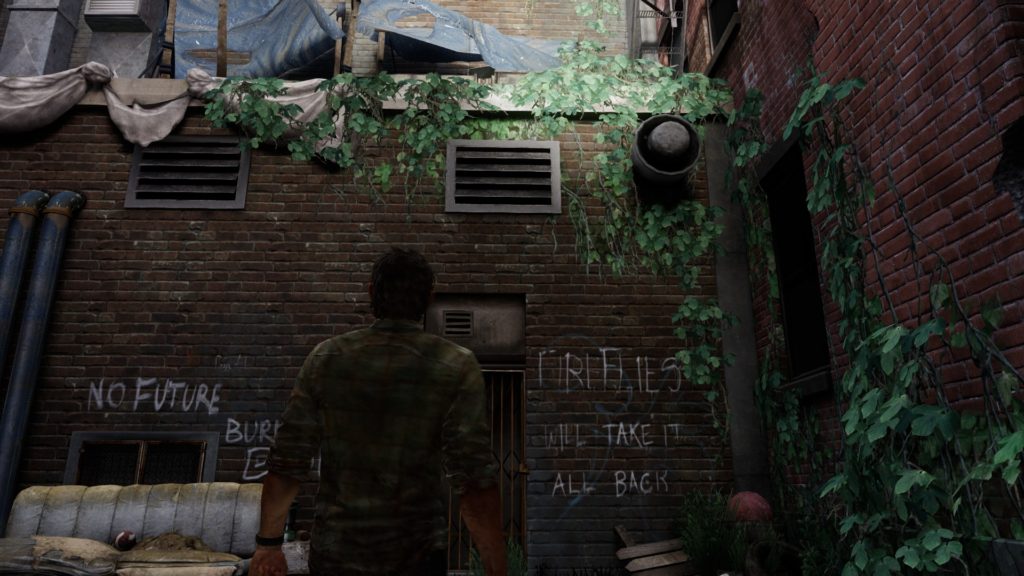Games are agents of deception, tricking us with their realistic visuals and bombastic sound effects, but none of us feel cheated because none of us are going in blind; we know it’s not actually real, which is why none of us give up on a game when the veil of realism comes toppling down.
This is most prevalent when we hit invisible walls or, even worse, when we hit visible ones. There’s nothing more frustrating than seeing a field beyond a 3ft fence and not being able to hop over it. We understand why the field and the fence are there; the fence is preventing you from reaching negative space and the field adds perceivable depth. That’s more preferable than hitting an unseen barrier with nothing but a void beyond it.
Developers have made efforts to alleviate the problem. Adding contextual assets like fences and unreachable fields is one solution. Another is having the character interact with the barriers, like Nathan Drake does in the Uncharted series. In Lego Star Wars: The Force Awakens the game autopilots your Millennium Falcon back towards the fight when you fly too far away.
We quickly accept the game’s limitations with a quick shrug, or at least with an eye roll and a breathy chuckle, and yet this wealth of evidence that these barriers don’t go anywhere still doesn’t stop us from trying.
Be honest with yourself: how many times have you encountered the game’s edge and inhumanely forced the character around the perimeter like a window squeegee?

EXPLORATION
I don’t know if this has been an impression forced on us intentionally by developers or if it’s another one of those obnoxious assumptions we make as gamers, but we expect every nook and cranny of the game world to be filled with rewards. “Otherwise,” we ask ourselves, “what’s the point?”
Exploration often leads to rewards. The majority of games, specifically Ubisoft titles, are full of fetch quests. Sometimes they’re in the guise as side quests which often result in EXP; other times they’re in the game to pad out its longevity and to obtain Achievements/Trophies.
But there are games that are void of collectibles for a reason. Perhaps the location is barren for narrative purposes. Maybe the space is there for fighting your enemies. Or maybe you’re Naughty Dog and you just want to make an alleyway with some graffiti and a manky sofa.

THE UNKNOWN
When there’s a fork in the road we can’t choose one. We choose both. And the road we always take first is the one we hope has a treasure chest conveniently placed at a dead end. If we accidentally take the road that takes us to the next stage we kick ourselves because the idea of not knowing where the other road leads drives us to madness.
The God of War series is renowned for this. God of War doesn’t encourage exploration. It encourages you to gamble, because once you pick a path there’s no turning back; the way you came is locked off with an invisible wall. The problem is that you know the other route leads to upgrades. Upgrades you know are vital. The tragedy is living with the choice you’ve made, and that sucks.
And in some circumstances it’s not about reward. It’s about knowledge. There are parts of Legend of Zelda: Windwaker and Okami that I’ve never discovered. In my ignorance I’ve finished both games so they can’t be necessary discoveries but knowing of their existence is the dangling carrot that has me vowing to return to them.
IT HAPPENS IN REAL LIFE TOO
When you leave the house for work in the morning you take the quickest route possible. You’re on a mission and your goal is simple; get to work. In reality most of your actions already have a predetermined outcome and a path of less resistance to achieving it.
However, when you attend a beer festival or a games convention you spend an unmeasurable amount of time walking around looking at stuff. Sure, you might go in with a game-plan but the notion to explore is a powerful one. You literally don’t know what’s at the other end of the venue so you find out.
So your intentions are clear: you’ve gone there to drink beer/play games but you also know that this event has been built from the ground up. Things to see and do have been purposefully place in the available space. You’re right, there might be nothing behind the burger stand, but when you’re dying for a piss knowing there’s a Portaloo behind it is invaluable information.

So the reasons why we bumble into boundaries like a dopey fly trapped in a conservatory isn’t to push pass them. We do it to discover something new, whether it’s knowledge or a massive sword.








